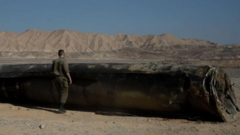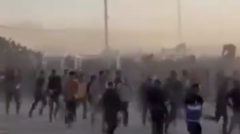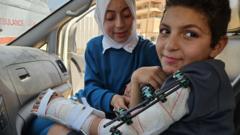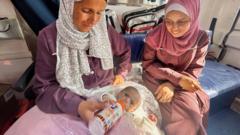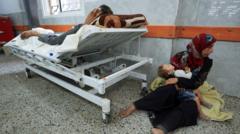An analysis of ongoing conflict raises serious questions regarding compliance with international law while documenting civilian casualties and claims of humanitarian crises.
**Israel Faces Accusations of War Crimes Amid Growing International Scrutiny**

**Israel Faces Accusations of War Crimes Amid Growing International Scrutiny**
As Israel’s military actions in Gaza become increasingly lethal and controversial, the potential repercussions for its leaders may extend far beyond the battlefield.
In the theater of war, governing principles known as the Geneva Conventions are meant to safeguard the lives of civilians, regardless of the circumstances surrounding the conflicts. On October 7, 2023, Israel endured a shocking assault from Hamas, which led to the deaths of approximately 1,200 individuals, predominantly civilians. However, this does not grant Israel immunity from its obligations under international humanitarian laws aimed at protecting non-combatants in warfare.
At the International Committee of the Red Cross (ICRC) in Geneva, the commitment to these humanitarian standards is unequivocal, underscoring that “Even Wars Have Rules.” Yet, reports increasingly suggest that violations are rampant on both sides. With nearly 14,500 Palestinian children reportedly dead in Gaza since the onset of hostilities, the dire situation is compounded by an information blockade that limits independent verification of the humanitarian crisis unfolding in the region.
Access to Gaza is constrained, making it challenging to ascertain accurate casualty figures. According to data collected from the health ministry in Gaza, Israeli military actions have killed over 54,607 Palestinians and injured 125,341 since October 7. This alarming toll raises discomforting questions about Israel's adherence to the Geneva Conventions and has led to speculation regarding potential war crimes.
The narrative from the Israeli government, particularly under Prime Minister Benjamin Netanyahu, frames its military operations as essential to national defense against terrorist threats, particularly those posed by Hamas. However, mounting dissent within Israel’s political circles claims that Netanyahu is perpetuating conflict to protect his own political standing and evade legal scrutiny regarding past corruption charges.
The broader implications of Israel's actions are reverberating throughout diplomatic channels. Western diplomats express increasing concern about being perceived as accomplices in potential war crimes amidst mounting death tolls and humanitarian crises in Gaza. A turn in public opinion is apparent in several European countries, where calls for immediate cessation of hostilities are gaining traction alongside discussions surrounding potential recognition of Palestinian statehood.
ICRC President Mirjana Spoljaric articulates profound concern over the moral failings associated with the ongoing devastation in Gaza. She emphasizes that the current trajectory not only strips Palestinians of their dignity but also threatens to embolden norms that undermine global humanitarian principles. The ongoing blockade has effectively weaponized food, generating further debate regarding the legality of Israel's wartime strategies.
As international scrutiny intensifies, both Israel and Hamas find themselves confronting grave allegations. Calls for accountability are gathering momentum, with legal proceedings at international courts suggesting that the actions of both parties may lead to further investigations into war crimes.
The question of genocide is emerging as a pivotal legal and moral battleground. Allegations against Israel contend that the intent behind certain military strategies constitutes genocidal actions — a complex assertion that underscores the ongoing humanitarian disaster. With separatist actions marked by civilian suffering, the consequences are likely to shape the international community's engagement with Israel long after the current conflict subsides.
The ramifications of this conflict extend beyond immediate humanitarian concerns, prompting a reevaluation of historical narratives that define the Israeli-Palestinian relationship. As military strategies intertwine with deeply rooted societal grievances, the path forward remains fraught with uncertainty, forcing a confrontation with difficult truths about justice, accountability, and peace.
At the International Committee of the Red Cross (ICRC) in Geneva, the commitment to these humanitarian standards is unequivocal, underscoring that “Even Wars Have Rules.” Yet, reports increasingly suggest that violations are rampant on both sides. With nearly 14,500 Palestinian children reportedly dead in Gaza since the onset of hostilities, the dire situation is compounded by an information blockade that limits independent verification of the humanitarian crisis unfolding in the region.
Access to Gaza is constrained, making it challenging to ascertain accurate casualty figures. According to data collected from the health ministry in Gaza, Israeli military actions have killed over 54,607 Palestinians and injured 125,341 since October 7. This alarming toll raises discomforting questions about Israel's adherence to the Geneva Conventions and has led to speculation regarding potential war crimes.
The narrative from the Israeli government, particularly under Prime Minister Benjamin Netanyahu, frames its military operations as essential to national defense against terrorist threats, particularly those posed by Hamas. However, mounting dissent within Israel’s political circles claims that Netanyahu is perpetuating conflict to protect his own political standing and evade legal scrutiny regarding past corruption charges.
The broader implications of Israel's actions are reverberating throughout diplomatic channels. Western diplomats express increasing concern about being perceived as accomplices in potential war crimes amidst mounting death tolls and humanitarian crises in Gaza. A turn in public opinion is apparent in several European countries, where calls for immediate cessation of hostilities are gaining traction alongside discussions surrounding potential recognition of Palestinian statehood.
ICRC President Mirjana Spoljaric articulates profound concern over the moral failings associated with the ongoing devastation in Gaza. She emphasizes that the current trajectory not only strips Palestinians of their dignity but also threatens to embolden norms that undermine global humanitarian principles. The ongoing blockade has effectively weaponized food, generating further debate regarding the legality of Israel's wartime strategies.
As international scrutiny intensifies, both Israel and Hamas find themselves confronting grave allegations. Calls for accountability are gathering momentum, with legal proceedings at international courts suggesting that the actions of both parties may lead to further investigations into war crimes.
The question of genocide is emerging as a pivotal legal and moral battleground. Allegations against Israel contend that the intent behind certain military strategies constitutes genocidal actions — a complex assertion that underscores the ongoing humanitarian disaster. With separatist actions marked by civilian suffering, the consequences are likely to shape the international community's engagement with Israel long after the current conflict subsides.
The ramifications of this conflict extend beyond immediate humanitarian concerns, prompting a reevaluation of historical narratives that define the Israeli-Palestinian relationship. As military strategies intertwine with deeply rooted societal grievances, the path forward remains fraught with uncertainty, forcing a confrontation with difficult truths about justice, accountability, and peace.


